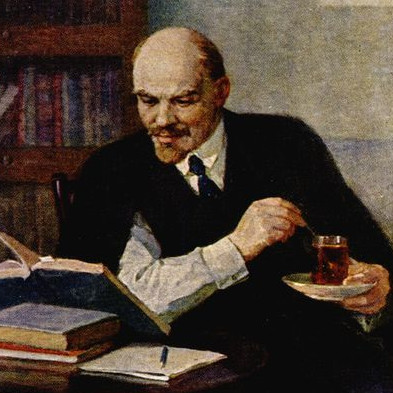
Article calls AfD left wing. What the fuck is this website.

Article calls AfD left wing. What the fuck is this website.


United $$nake$$ of Amerikkka


Guy who argues mumble rap is stupid because you can’t even understand what they’re saying while listening to Jack Stauber on spotify.


The sad fact for Marxists in the west is that the Anarchists are more organized and do more praxis these days.
I find it very annoying when my fellow comrades respond to the actions taken by Anarchists or non-Marxists by simply belittling them.
“occupy did nothing. chaz was doomed from the start. etc.”
If we think we are supposed to be the vanguard, the most proactive guardians and forward pushers of the working class’s power, we need to start doing shit. Because right now we’re a laughing stock of sit-around bookreaders arguing theology.
Our main attack against all other forms of socialism are that they’ve never won and secured a worker state. Well right now the Marxists in the west haven’t even started.
Marxists who do nothing but post will come up with some horrible names to call me which are just new fancier versions of “heretic” but as it stands, (on average) even the least read anarchist in Food Not Bombs has done more to advance worker power than the most well read “Marxist” in a typical org.
The clearest example I can think of:
It was New York City Anarchists working as part of the Direct Action Network who secured the massive abolition of Third World debt owed to the IMF. And it is not exaggeration to say they also almost suceeded in abolishing the IMF entirely. Despite the most vocal opposition to the IMF coming from us Marxists, it seems right now we are all talk. We must improve.
EDIT: I misremembered: DAN was most active in NYC but the anti-IMF successes were across the US not just NYC.


OP, your question is touching on a great discussion between how much of our social order is arbitrary and how much is determined by material conditions (for example: having visited Cuba, a thoroughly socialist state, I witnessed racism to about the same level as would exist in progressive communities in the US despite no capitalist relations to produce it.). The dialectic between the base and the superstructure, as a Marxist might put it.
I didn’t want to muddy up my comment with a long quote, but I think this one has some nice insights.
But if reading isn’t one’s forte then the tl;dr is from Marx: “Men make their own history, but they do not make it as they please”
These are from a book called “The Utopia of Rules: On Technology, Stupidity, and the Secret Joys of Bureaucracy”
From a left perspective, then, the hidden reality of human life is the fact that the world doesn’t just happen. It isn’t a natural fact, even though we tend to treat it as if it is—it exists because we all collectively produce it. We imagine things we’d like and then we bring them into being. But the moment you think about it in these terms, it’s obvious that something has gone terribly wrong. Since who, if they could simply imagine any world that they liked and then bring it into being, would create a world like this one?
Perhaps the leftist sensibility was expressed in its purest form in the words of Marxist philosopher John Holloway, who once wanted to title a book, “Stop Making Capitalism.” . . . This is the ultimate revolutionary question: what are the conditions that would have to exist to enable us to do this—to just wake up and imagine and produce something else?
To this emphasis on forces of creativity and production, the Right tends to reply that revolutionaries systematically neglect the social and historical importance of the “means of destruction”: states, armies, executioners, barbarian invasions, criminals, unruly mobs, and so on. Pretending such things are not there, or can simply be wished away, they argue, has the result of ensuring that left-wing regimes will in fact create far more death and destruction than those that have the wisdom to take a more “realistic” approach.
Elements of the Right dabbled with the artistic ideal, and twentieth-century Marxist regimes often embraced essentially right-wing theories of power . . . in their obsession with jailing poets and playwrights whose work they considered threatening, they evinced a profound faith in the power of art and creativity to change the world—those running capitalist regimes rarely bothered, convinced that if they kept a firm hand on the means of productions (and, of course, the army and police), the rest would take care of itself.


The question every leftist has been trying to answer for the past 200 years is this:
“What are the conditions that would let us we wake up tomorrow and not do capitalism?”
All political theory on praxis has been trying to answer this question.
If everyone were class concious, the answer would be simple: just don’t.


ai art is art because people are mad about it.
jokes aside, i think that machine art is going to basically just replace clip art and the like. it’s like what happened to pottery. there are still artisinal potters (i love handmade pottery and the craft itself) but for everyday dinner plates you don’t seek the connection and craftsmanship. you just need a plate.
some art has use-value as decoration (easily replaced with machines) and other art is about personal, emotional, or political communication (even if it could be replaced, it wouldn’t be.)
it’s literally a broken chain.
Literally a broken chain.
You could make a movie called ‘The Folly of the Phallus’ where a man shoots himself in the foot everytime he feels emotions and people would idolize the main characters and complain that the message wasn’t clear enough.


Is there a news article about the provocation?
The reason for the VAT (in the USSR it was called a Turnover Tax. They’re the same thing but a VAT does not tax means of production) was how incredibly simple it was to administer. Tax fraud could be kept relatively low for any given level of administration if a VAT was used instead of an income tax, for example. Many modern governments do this today for the same reason.
The USSR was constantly in a struggle to build an effective administration (a good book on this is Origins of the Great Purges ) while fighting what we today would call Bullshit Jobs and local strongmen.
Post-Deng China basically took a hands off approach to local strongmen and corruption skyrocketed but economic growth was heightened. The USSR was trying to mitigate markets (most of which were black markets) to prevent shortages and mismanagement in its planned economy. So the Deng approach was not something it could do. The USSR was much more developed at the time and the intricate web of an economy was more complicated than in China.
Just a reminder that the USSR had a VAT as its main tax revenue for almost its entire existence.
unfortunately not :/


The evidence we have is that Swiss banks are likely key in how sanctions against Russia are being avoided.
https://www.bloomberg.com/news/articles/2022-09-20/swiss-imports-of-russian-gold-climb-to-highest-since-april-2020


it depends on what you mean by BRICS, the EU, and imperialism.
Usually what people are referring to is the breakdown of something called Dollar Recycling and usually this gets lumped in with the specific way the US ruling class impose their economic will over the rest of the world.
Often people start with a history lesson beginning just after WWII, and I can link a video if you’d be interested, but in short:
sidenote: It’s not actually “Argentina” or “Brazil” doing this. The businesses in these countries put in purchase requests for US Dollars at the Chicago Clearing House or some other bank, and then they pay a fee to exchange their currency for US Dollars, and then trade with each other, and then pay the bank to exchange it back.
sidenote 2: Sometimes these businesses go to their own country’s central banks to exchange the money so the central bank acts as a middle man of sorts.
.
If a business in the US wants to buy something from abroad, it can just do so without having to worry about where to get US Dollars from since it always uses US Dollars anyway. When French businesses, for example, wants to buy something from abroad, they has to first sell something to get the US Dollars they needs (often to the US) or they have to use a US bank or clearing house to exchange Euros for US Dollars.
Chinese businesses is becoming the largest trading partners of many countries, not the US ones anymore. So many countries can get US Dollars without having to sell to US businesses.
What is likely going to happen is that the BRICS countries (probably better referred to simply as the China Trading Block since all of the other countries are in a subservient role) will make their own crypto currency similar to Tether which is backed by US Dollars that China has in abundance.
This means that there is now a competing currency to the US Dollar but which can easily be exchanged for US Dollars without needing to use any US Banks at all. Thus the power the US businesses have will be weakened.


That’s about what I expected. It’s the same in the west. Very few people are ardent neoliberals but many just support their team (if they are politically active at all).


i watch kevin walmsley for the info he provides. i (and everyone else) can think for themselves haha. the info he shares is good but his conclusions and biases are wrong and can easily just be ignored.
as for my other comment, i do still believe that and i have actual evidence of it now.


sounds a bit anarchist


I don’t think slur is the appropriate word to use here.
There are people who simply support China because it isn’t the US. For example, one of the best sources for economic news about China is Inside China Business. He lives in China and supports China but he literally thinks that the reason for China’s success is that God is rewarding them for being the largest Christian nation and punishing the US for abandoning the faith. I don’t know what other word to describe this guy and people like him as.
That is not what it says.